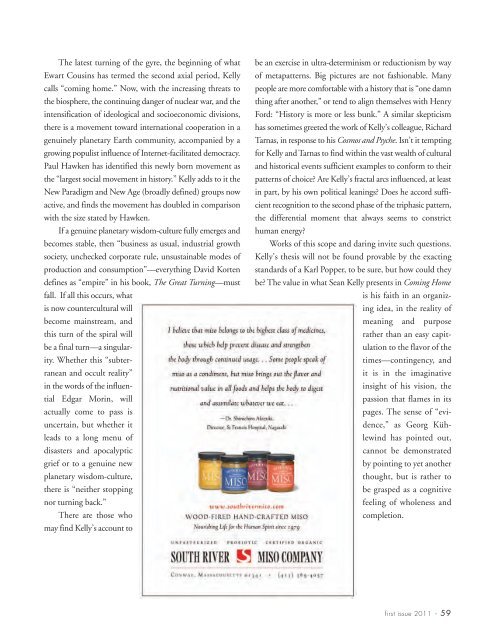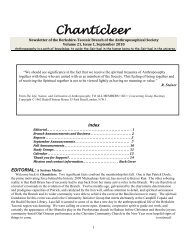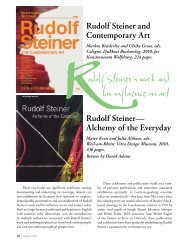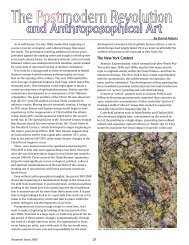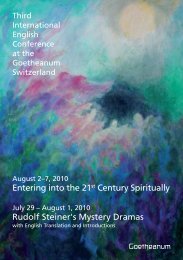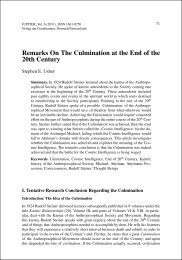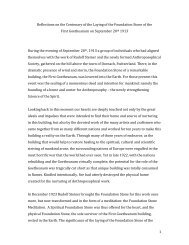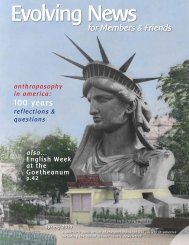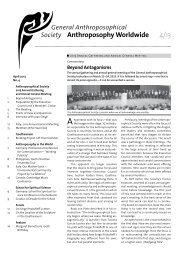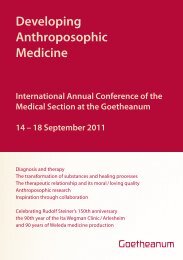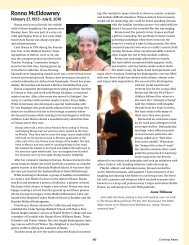Rudolf Steiner's Vision for the Future - Anthroposophical Society in ...
Rudolf Steiner's Vision for the Future - Anthroposophical Society in ...
Rudolf Steiner's Vision for the Future - Anthroposophical Society in ...
You also want an ePaper? Increase the reach of your titles
YUMPU automatically turns print PDFs into web optimized ePapers that Google loves.
The latest turn<strong>in</strong>g of <strong>the</strong> gyre, <strong>the</strong> beg<strong>in</strong>n<strong>in</strong>g of what<br />
Ewart Cous<strong>in</strong>s has termed <strong>the</strong> second axial period, Kelly<br />
calls “com<strong>in</strong>g home.” Now, with <strong>the</strong> <strong>in</strong>creas<strong>in</strong>g threats to<br />
<strong>the</strong> biosphere, <strong>the</strong> cont<strong>in</strong>u<strong>in</strong>g danger of nuclear war, and <strong>the</strong><br />
<strong>in</strong>tensification of ideological and socioeconomic divisions,<br />
<strong>the</strong>re is a movement toward <strong>in</strong>ternational cooperation <strong>in</strong> a<br />
genu<strong>in</strong>ely planetary Earth community, accompanied by a<br />
grow<strong>in</strong>g populist <strong>in</strong>fluence of Internet-facilitated democracy.<br />
Paul Hawken has identified this newly born movement as<br />
<strong>the</strong> “largest social movement <strong>in</strong> history.” Kelly adds to it <strong>the</strong><br />
New Paradigm and New Age (broadly def<strong>in</strong>ed) groups now<br />
active, and f<strong>in</strong>ds <strong>the</strong> movement has doubled <strong>in</strong> comparison<br />
with <strong>the</strong> size stated by Hawken.<br />
If a genu<strong>in</strong>e planetary wisdom-culture fully emerges and<br />
becomes stable, <strong>the</strong>n “bus<strong>in</strong>ess as usual, <strong>in</strong>dustrial growth<br />
society, unchecked corporate rule, unsusta<strong>in</strong>able modes of<br />
production and consumption”—everyth<strong>in</strong>g David Korten<br />
def<strong>in</strong>es as “empire” <strong>in</strong> his book, The Great Turn<strong>in</strong>g—must<br />
fall. If all this occurs, what<br />
is now countercultural will<br />
become ma<strong>in</strong>stream, and<br />
this turn of <strong>the</strong> spiral will<br />
be a f<strong>in</strong>al turn—a s<strong>in</strong>gularity.<br />
Whe<strong>the</strong>r this “subterranean<br />
and occult reality”<br />
<strong>in</strong> <strong>the</strong> words of <strong>the</strong> <strong>in</strong>fluential<br />
Edgar Mor<strong>in</strong>, will<br />
actually come to pass is<br />
uncerta<strong>in</strong>, but whe<strong>the</strong>r it<br />
leads to a long menu of<br />
disasters and apocalyptic<br />
grief or to a genu<strong>in</strong>e new<br />
planetary wisdom-culture,<br />
<strong>the</strong>re is “nei<strong>the</strong>r stopp<strong>in</strong>g<br />
nor turn<strong>in</strong>g back.”<br />
There are those who<br />
may f<strong>in</strong>d Kelly’s account to<br />
be an exercise <strong>in</strong> ultra-determ<strong>in</strong>ism or reductionism by way<br />
of metapatterns. Big pictures are not fashionable. Many<br />
people are more com<strong>for</strong>table with a history that is “one damn<br />
th<strong>in</strong>g after ano<strong>the</strong>r,” or tend to align <strong>the</strong>mselves with Henry<br />
Ford: “History is more or less bunk.” A similar skepticism<br />
has sometimes greeted <strong>the</strong> work of Kelly’s colleague, Richard<br />
Tarnas, <strong>in</strong> response to his Cosmos and Psyche. Isn’t it tempt<strong>in</strong>g<br />
<strong>for</strong> Kelly and Tarnas to f<strong>in</strong>d with<strong>in</strong> <strong>the</strong> vast wealth of cultural<br />
and historical events sufficient examples to con<strong>for</strong>m to <strong>the</strong>ir<br />
patterns of choice? Are Kelly’s fractal arcs <strong>in</strong>fluenced, at least<br />
<strong>in</strong> part, by his own political lean<strong>in</strong>gs? Does he accord sufficient<br />
recognition to <strong>the</strong> second phase of <strong>the</strong> triphasic pattern,<br />
<strong>the</strong> differential moment that always seems to constrict<br />
human energy?<br />
Works of this scope and dar<strong>in</strong>g <strong>in</strong>vite such questions.<br />
Kelly’s <strong>the</strong>sis will not be found provable by <strong>the</strong> exact<strong>in</strong>g<br />
standards of a Karl Popper, to be sure, but how could <strong>the</strong>y<br />
be? The value <strong>in</strong> what Sean Kelly presents <strong>in</strong> Com<strong>in</strong>g Home<br />
is his faith <strong>in</strong> an organiz<strong>in</strong>g<br />
idea, <strong>in</strong> <strong>the</strong> reality of<br />
mean<strong>in</strong>g and purpose<br />
ra<strong>the</strong>r than an easy capitulation<br />
to <strong>the</strong> flavor of <strong>the</strong><br />
times—cont<strong>in</strong>gency, and<br />
it is <strong>in</strong> <strong>the</strong> imag<strong>in</strong>ative<br />
<strong>in</strong>sight of his vision, <strong>the</strong><br />
passion that flames <strong>in</strong> its<br />
pages. The sense of “evidence,”<br />
as Georg Kühlew<strong>in</strong>d<br />
has po<strong>in</strong>ted out,<br />
cannot be demonstrated<br />
by po<strong>in</strong>t<strong>in</strong>g to yet ano<strong>the</strong>r<br />
thought, but is ra<strong>the</strong>r to<br />
be grasped as a cognitive<br />
feel<strong>in</strong>g of wholeness and<br />
completion.<br />
first issue 2011 • 59


